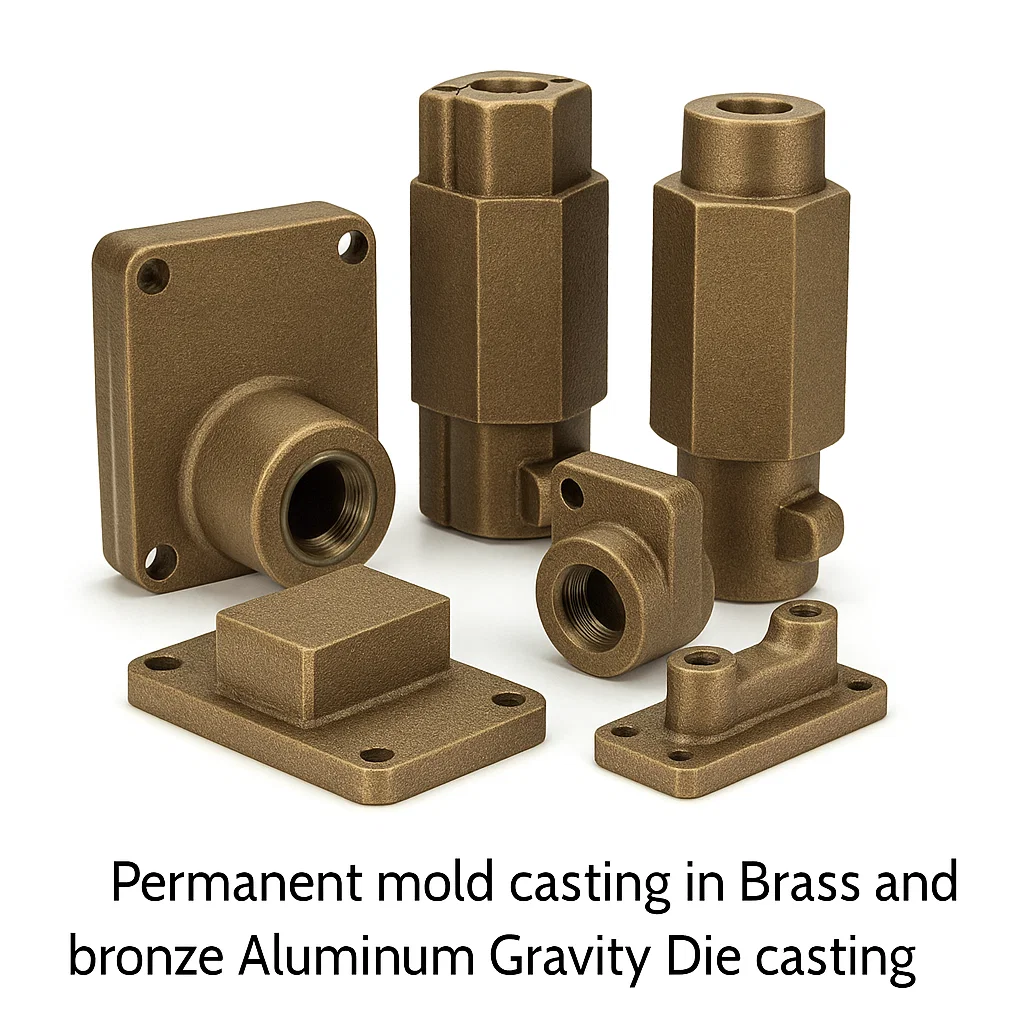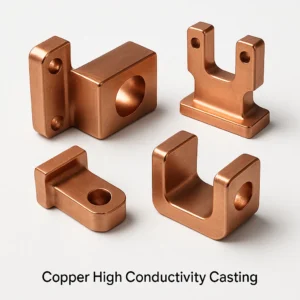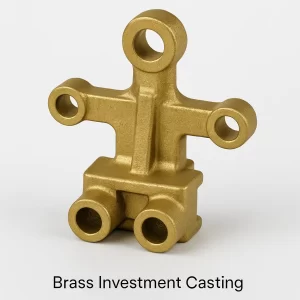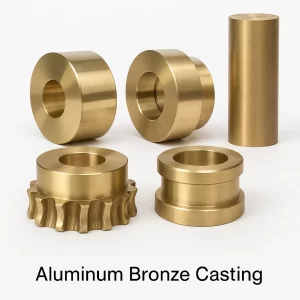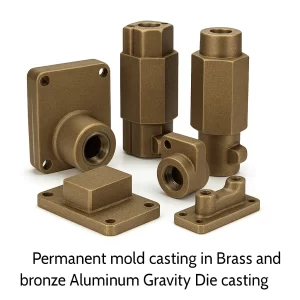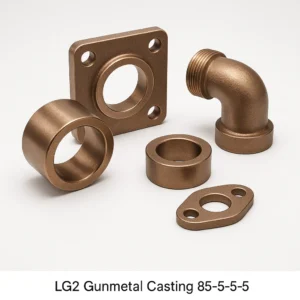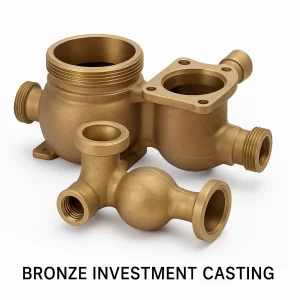Comprehensive Overview of Aluminum Gravity Die Casting Services
We are one of the leading manufacturers and exporters of Aluminum Gravity Die Castings, Permanent Mold Aluminum Castings, and High-Quality Aluminum Components from India. We have been supplying high-quality aluminum gravity die cast automotive parts, aluminum die cast hydraulic components, aluminum gravity cast pump bodies, aluminum die cast gearbox housings, aluminum gravity cast heat sinks, aluminum die cast motor housings, aluminum gravity cast valve bodies, and custom aluminum castings to the world market for many decades. Our state-of-the-art foundry specializes in producing premium aluminum gravity die castings using advanced permanent mold casting, tilt gravity die casting, low-pressure die casting, CNC machining, heat treatment, surface treatment, and comprehensive quality control systems. With over three decades of global experience in aluminum gravity die casting, we serve diverse industries including automotive and transportation (engine components, transmission parts, brake components, suspension parts), hydraulic and pneumatic systems (valve bodies, manifold blocks, pump housings, cylinder bodies), industrial machinery (gearbox housings, motor frames, pump casings), HVAC and refrigeration (compressor housings, heat exchangers, manifolds), electrical and electronics (heat sinks, motor housings, control boxes, junction boxes), marine and defense (engine components, transmission housings), agricultural equipment (tractor components, irrigation pump parts), and general engineering (custom aluminum castings, structural components). Our expertise encompasses working with various aluminum casting alloys including Aluminum Silicon Alloys (Al Si7Mg, Al Si10Mg, Al Si12 – excellent castability and strength), Aluminum Silicon Copper Alloys (Al Si5Cu3, Al Si9Cu3 – enhanced machinability), Aluminum Magnesium Alloys (Al Mg5, Al Mg9 – superior corrosion resistance), Aluminum Copper Alloys (Al Cu4Ti – high strength applications), and custom aluminum alloys meeting specific requirements. We manufacture aluminum gravity die castings ranging from 50 grams to 50 kg with dimensions from 30mm to 1200mm, maintaining tensile strength 150-350 MPa, excellent dimensional accuracy ±0.3-1.0mm, superior surface finish Ra 3.2-6.3 μm as-cast, pressure tightness up to 10 bar, compliance with ASTM B108, BS 1490, DIN EN 1706, ISO 3522, automotive OEM standards, and reliable long-term performance in demanding automotive, hydraulic, and industrial applications.
Aluminum Gravity Die Casting Process
Aluminum Gravity Die Casting (also called permanent mold casting) is a casting process where molten aluminum is poured into a permanent metal mold (die) under the influence of gravity only, without external pressure. The metal mold is typically made of cast iron or steel, reusable for thousands of casting cycles, providing excellent dimensional accuracy and surface finish compared to sand casting.
Process Description
Die Preparation: Permanent metal dies (typically H13 tool steel or cast iron) preheated to 200-300°C preventing premature solidification, release agent (graphite-based) sprayed on die surfaces preventing aluminum sticking, cores inserted for internal cavities (metal or sand cores), dies closed and clamped ready for pouring.
Aluminum Melting: Aluminum alloy melted in gas-fired or electric furnaces at 700-750°C, degassing treatment with nitrogen or argon removing hydrogen porosity, grain refining additions (titanium boron) improving mechanical properties, melt cleanliness maintained through flux treatment and filtration.
Pouring: Molten aluminum poured into die through pouring basin and gating system, gravity flow filling the cavity from bottom up, pouring rate controlled preventing turbulence and air entrapment, filling time typically 3-15 seconds depending on casting size, operators skilled in pouring technique critical for quality.
Solidification: Aluminum solidifies in metal die cooling by conduction and water cooling channels, solidification time 30 seconds to 5 minutes depending on section thickness, directional solidification from thin sections to thick sections preventing shrinkage porosity, risers and feeders compensating for solidification shrinkage.
Ejection: After solidification, dies opened and casting ejected using ejector pins, casting temperature 200-300°C at ejection, trimming excess material from gates and runners, casting transferred to cooling rack, dies cleaned and prepared for next cycle.
Cycle Time: Typical cycle time 2-8 minutes depending on casting size and complexity, production rate 10-100 castings per die per day, faster than sand casting but slower than high-pressure die casting, economical for medium to high production volumes 500-100,000 pieces annually.
Tilt Gravity Die Casting
Process Variation: Die mounted on tilting mechanism, initially horizontal or slightly tilted, molten aluminum poured into pouring cup, die tilted slowly (1-30 degrees per second) filling cavity progressively, controlled filling reducing turbulence and air entrapment, superior casting quality versus traditional gravity pour, suitable for complex thin-wall castings.
Advantages: Reduced porosity from controlled filling, improved mechanical properties, better surface finish, suitable for complex geometries, wheel rims, structural components, aerospace parts.
Low-Pressure Die Casting
Process Description: Die mounted above sealed furnace holding molten aluminum, pressurized air (0.3-1.0 bar) applied to furnace forcing aluminum up through riser tube into die cavity, pressure maintained during solidification, controlled filling and directional solidification, superior to gravity die casting for critical applications.
Advantages: Minimal turbulence and gas entrapment, excellent mechanical properties, pressure tightness for hydraulic components, 15-20% higher yield versus gravity die casting, suitable for automotive wheels, structural parts, hydraulic manifolds.
Aluminum Casting Alloys
Aluminum Silicon Alloys (Al-Si)
Al Si7Mg (A356, LM25): Composition 7% Si, 0.3% Mg, balance Al, tensile strength 180-280 MPa (T6 heat treated), excellent castability and fluidity, good corrosion resistance, heat treatable to T6 condition, most widely used aluminum casting alloy, applications in automotive engine components, transmission housings, structural parts, general engineering castings, excellent strength-to-weight ratio.
Al Si10Mg (A360, LM6): Composition 10% Si, 0.3% Mg, balance Al, tensile strength 160-240 MPa, excellent fluidity for thin-wall castings, good corrosion resistance, moderate strength, applications in pump housings, valve bodies, heat sinks, intricate thin-wall components, most common die casting alloy.
Al Si12 (A413, LM2): Composition 12% Si, balance Al, excellent castability and fluidity, lower strength than Al Si7Mg, good wear resistance, applications in pistons, cylinder liners, general castings requiring good castability, cost-effective for non-critical applications.
Aluminum Silicon Copper Alloys (Al-Si-Cu)
Al Si5Cu3 (A319, LM24): Composition 5% Si, 3% Cu, balance Al, tensile strength 180-260 MPa, excellent machinability from copper addition, moderate corrosion resistance, heat treatable, applications in automotive cylinder heads, engine blocks, transmission cases, gearbox housings requiring extensive machining.
Al Si9Cu3 (A380, LM24): Composition 9% Si, 3% Cu, balance Al, tensile strength 230-320 MPa, superior machinability, good castability, moderate corrosion resistance, most machinable aluminum alloy, applications in hydraulic valve bodies, manifolds, intricate machined components, automotive parts.
Aluminum Magnesium Alloys (Al-Mg)
Al Mg5 (A514, LM10): Composition 5% Mg, balance Al, tensile strength 200-280 MPa, excellent corrosion resistance especially marine environments, good weldability, non-heat-treatable, applications in marine components, food processing equipment, architectural castings, corrosion-critical applications.
Al Mg9 (A518): Composition 9% Mg, balance Al, tensile strength 250-320 MPa, maximum corrosion resistance among aluminum alloys, excellent for marine and coastal, non-heat-treatable, applications in marine hardware, offshore equipment, coastal architectural elements.
Aluminum Alloy Selection Guide
| Alloy | Tensile Strength | Castability | Machinability | Corrosion Resistance | Typical Applications |
|---|---|---|---|---|---|
| Al Si7Mg (A356) | 180-280 MPa | Excellent | Good | Excellent | Automotive, structural, general |
| Al Si10Mg (A360) | 160-240 MPa | Excellent | Good | Good | Thin-wall, pumps, valves |
| Al Si5Cu3 (A319) | 180-260 MPa | Good | Excellent | Moderate | Cylinder heads, machined parts |
| Al Si9Cu3 (A380) | 230-320 MPa | Excellent | Excellent | Moderate | Hydraulic, machined components |
| Al Mg5 (A514) | 200-280 MPa | Fair | Good | Excellent | Marine, corrosive environments |
Advantages of Gravity Die Casting
Versus Sand Casting
Superior Dimensional Accuracy: Tolerance ±0.3-1.0mm versus ±1.5-3.0mm for sand casting, reduced machining requirements, near-net-shape capabilities, consistent dimensions part-to-part from permanent mold. Better Surface Finish: As-cast Ra 3.2-6.3 μm versus 12.5-25 μm for sand, reduced finishing operations, improved appearance, better sealing surfaces. Enhanced Mechanical Properties: Finer grain structure from faster cooling, 20-30% higher tensile strength versus sand casting, improved ductility, reduced porosity, superior pressure tightness. Higher Production Rate: 10-100 castings per die daily versus 5-20 molds per day for sand, lower labor content, faster cycle times, economical for medium to high volumes.
Versus High-Pressure Die Casting
Thicker Walls Possible: Minimum wall 3-5mm versus 1.5-3mm for HPDC, suitable for structural components, pressure-containing housings, heavier section castings. Heat Treatable: Gravity die castings can be T4 or T6 heat treated improving strength and hardness, HPDC generally not heat treatable due to gas porosity. Superior Mechanical Properties: Lower porosity yielding better tensile properties, improved ductility and elongation, suitable for structural and safety-critical components. Lower Tooling Cost: Simpler dies without complex mechanisms, tooling cost 30-50% lower than HPDC, economical for medium production volumes 500-50,000 pieces. Less Turbulence: Gravity filling reduces gas entrapment versus high-velocity HPDC injection, better pressure tightness, suitable for hydraulic components up to 100 bar.
Versus Investment Casting
Faster Production: Cycle time 2-8 minutes versus hours for investment casting, higher production rates, suitable for medium to high volumes. Lower Cost: 40-60% lower production cost for medium volumes >500 pieces, permanent tooling versus consumable molds. Larger Sizes: Gravity die casting economical for larger components 100mm to 1200mm, investment casting limited to smaller sizes <500mm.
Applications by Industry
Automotive and Transportation
Engine Components: Aluminum gravity die cast cylinder heads for 4-cylinder, 6-cylinder, V8 engines, engine blocks for small to medium displacement, timing chain covers, oil pans, intake manifolds, valve covers, A356 or A319 alloys heat treated to T6, weight reduction versus cast iron, excellent thermal conductivity, typical tolerances ±0.5mm, production volumes 10,000-1,000,000 annually.
Transmission and Driveline: Transmission housings and cases, gearbox housings, differential housings, clutch housings, transfer case components, A356 or A380 alloys for strength and machinability, pressure tightness requirements for fluid containment, complex internal passages for lubrication.
Brake Components: Brake calipers for disc brake systems, master cylinder bodies, ABS modulator housings, brake booster components, A356 alloy for high strength and safety requirements, T6 heat treatment achieving 250-280 MPa tensile, critical safety components requiring 100% quality inspection.
Suspension Components: Control arm castings, knuckles, suspension links, steering components, MacPherson strut towers, A356 alloy T6 heat treated for structural strength, fatigue resistance critical, light weight reducing unsprung mass improving handling.
Electric Vehicle Components: Battery enclosures and housings, motor housings, inverter cases, charging port housings, heat sinks for power electronics, thermal management components, growing market for EV aluminum castings.
Hydraulic and Pneumatic Systems
Valve Bodies: Hydraulic valve bodies for directional control valves, proportional valves, servo valves, A380 or Al Si9Cu3 alloys for excellent machinability, complex internal passages requiring precision machining, pressure tightness 100-350 bar, surface finish Ra 0.8-3.2 μm on sealing surfaces, applications in mobile hydraulics, industrial hydraulics, aerospace.
Manifold Blocks: Hydraulic manifolds integrating multiple valve functions, pneumatic manifolds for compressed air distribution, sizes 100-500mm, multiple ports and internal passages, extensive CNC machining required, pressure testing 1.5× working pressure mandatory.
Pump Housings: Hydraulic pump housings for gear pumps, vane pumps, piston pumps, pneumatic compressor housings, water pump bodies, Al Si10Mg or A356 alloys for pressure containment, complex internal cavities, integrated mounting features, seal surfaces requiring precision machining.
Cylinder Bodies: Hydraulic cylinder bodies for linear actuators, pneumatic cylinder barrels, sizes 30-200mm bore diameter, precision boring for piston fit, surface finish Ra 0.4-1.6 μm for seal compatibility, pressure ratings 50-350 bar depending on wall thickness.
Industrial Machinery
Gearbox Housings: Industrial gearbox housings and cases, reducer housings, worm gear boxes, planetary gear housings, sizes 150-800mm, mounting flanges and bosses, integrated cooling fins, oil reservoir functions, A356 alloy for strength and pressure tightness, vibration resistance, noise dampening.
Motor Housings: Electric motor frames and housings, AC/DC motor end shields, servo motor housings, integrated cooling fins for heat dissipation, mounting feet and flanges, conduit boxes, A356 or Al Si10Mg alloys, sizes 80-400mm frame size, production volumes 1,000-100,000 annually.
Pump Components: Centrifugal pump casings and volutes, positive displacement pump bodies, chemical pump housings, slurry pump components, pressure ratings 10-40 bar, corrosion resistance requirements, Al Si10Mg or Al Mg5 for chemical service.
HVAC and Refrigeration
Compressor Housings: Scroll compressor housings, reciprocating compressor bodies, rotary compressor cases, integrated suction and discharge ports, mounting bosses, A356 or A380 alloys, sizes 100-400mm, medium to high production volumes 5,000-500,000.
Heat Exchangers: Aluminum heat exchanger manifolds, headers and end tanks, air conditioning evaporator housings, condenser housings, complex internal passages for refrigerant flow, brazed joint compatibility, Al Si10Mg alloy for fluidity and pressure tightness.
Manifolds and Distributors: Refrigerant distribution manifolds, valve manifolds for HVAC controls, fluid distribution blocks, multiple ports and passages, extensive CNC machining, pressure testing to 40-60 bar.
Electrical and Electronics
Heat Sinks: Aluminum gravity die cast heat sinks for power electronics, LED heat sinks, thermal management components, integrated cooling fins and channels, Al Si12 or Al Si10Mg for excellent thermal conductivity (160-180 W/m·K), complex fin geometries, surface anodizing for corrosion protection and thermal emissivity.
Motor Housings: Electric motor housings and frames, stepper motor bodies, servo motor cases, integrated mounting features and cable entries, cooling fins for heat dissipation, electromagnetic shielding, sizes 50-300mm.
Electrical Enclosures: Junction boxes, control boxes, terminal boxes, instrument housings, weather-resistant sealing surfaces, mounting provisions for electrical components, cable entry provisions, EMI/RFI shielding where required.
Marine and Defense
Marine Engine Components: Aluminum cylinder heads and blocks for marine diesel engines, transmission housings, gearbox cases, Al Mg5 alloys for superior seawater corrosion resistance, protective coatings additional protection, weight savings critical for marine vessels.
Transmission Components: Marine transmission housings, gearbox cases, propulsion system components, Al Si7Mg or Al Mg5 alloys for strength and corrosion resistance, pressure tightness for oil containment.
Defense Applications: Military vehicle components, aircraft ground support equipment, portable equipment housings, weapon system components, meeting military specifications MIL-A-21180.
Heat Treatment of Aluminum Castings
T4 Solution Heat Treatment
Process: Heating castings to 520-540°C for 4-12 hours (solutionizing), rapid water quench to room temperature, natural aging at room temperature 4-7 days. Effect: Dissolves alloying elements into solid solution, quenching retains supersaturated solution, natural aging precipitation strengthening, increases tensile strength 20-30%, improves ductility. Typical Properties: A356-T4 tensile strength 180-210 MPa, yield strength 110-140 MPa, elongation 8-12%. Applications: Components requiring good ductility and moderate strength, crash-sensitive automotive parts, formed or bent components.
T6 Artificial Aging
Process: Solution heat treatment (520-540°C for 4-12 hours, water quench), artificial aging at 155-175°C for 4-12 hours. Effect: Controlled precipitation of strengthening phases, maximum strength and hardness, reduced ductility versus T4. Typical Properties: A356-T6 tensile strength 240-280 MPa, yield strength 180-220 MPa, elongation 3-6%, hardness 70-95 HB. Applications: Structural components, engine parts, transmission housings, components requiring maximum strength.
T5 Artificial Aging Only
Process: As-cast components artificially aged 150-175°C for 2-8 hours without prior solution treatment. Effect: Moderate strength increase versus as-cast, lower cost than full T6 treatment. Applications: Cost-sensitive components, moderate strength requirements, large production volumes.
Manufacturing Capabilities and Quality Control
Advanced Gravity Die Casting Facilities
Die Manufacturing: In-house die design and manufacturing, CAD/CAM design using SolidWorks, Unigraphics, simulation software (MAGMA, ProCAST) optimizing gating and solidification, CNC machining of die cavities in H13 tool steel or cast iron, die polishing and surface treatment, die life 50,000-200,000 shots depending on alloy and complexity.
Melting Furnaces: Gas-fired and electric resistance furnaces 500-5,000 kg capacity, precise temperature control ±5°C, degassing systems (nitrogen, argon) reducing hydrogen porosity to <0.10 cc/100g, grain refiners (Al-5Ti-1B) achieving fine grain size 150-300 μm, automated flux treatment and dross removal.
Casting Equipment: 15-30 gravity die casting stations for various sizes 50g to 50kg, manual pouring and robotic pouring systems, tilting die casting machines for complex geometries, low-pressure die casting machines for critical components, production capacity 50,000-500,000 castings annually depending on size.
Heat Treatment Furnaces: Solution heat treatment furnaces to 550°C with atmosphere control, rapid quench tanks with agitation, aging ovens with precise temperature control ±3°C, computerized process control with data logging, capacity 500-5,000 kg per batch.
CNC Machining Centers
Equipment: 20+ CNC vertical machining centers, 5-axis CNC machines for complex surfaces, CNC horizontal boring machines for large components, CNC turning centers, precision grinding machines, honing machines for cylinder bores.
Capabilities: Machining aluminum castings to tolerances ±0.02-0.05mm, surface finish Ra 0.4-3.2 μm depending on operation, complex 3D surfaces and contours, deep hole drilling and boring, thread tapping and milling, complete machined ready-to-assemble components.
Surface Treatment Facilities
Anodizing: Sulfuric acid anodizing 5-25 microns thickness, hard anodizing 25-100 microns for wear resistance, various colors (clear, black, gold, blue), corrosion protection and decorative finish, suitable for A356, A380 alloys.
Powder Coating: Electrostatic powder coating epoxy, polyester, polyurethane, thickness 60-150 microns, color options, corrosion protection and appearance, suitable for all aluminum alloys.
E-coating (Electrocoating): Cathodic electrodeposition coating, excellent corrosion protection, uniform coating in recesses, automotive industry standard, coating thickness 15-30 microns.
Chromate Conversion: Chemical conversion coating (alodine), thin corrosion protection layer <1 micron, paint primer, electrical conductivity maintained, military specification MIL-DTL-5541.
Comprehensive Quality Control
Incoming Material Inspection: Spectrographic analysis of aluminum ingots verifying alloy composition within ASTM B108 or DIN EN 1706 specifications ±0.5%, visual inspection for defects, material certificates from aluminum suppliers with heat numbers.
In-Process Inspection: Dimensional inspection of first article before production, melt temperature monitoring and recording, degassing effectiveness testing (reduced pressure test), grain size measurement, die temperature monitoring, visual inspection every casting.
Mechanical Testing: Tensile testing per ASTM B557 or ISO 6892 on sample castings from each production batch, minimum 3 samples per heat/batch, hardness testing Brinell or Rockwell per ASTM E10/E18, elongation measurement, test certificates provided documenting compliance with specifications.
Non-Destructive Testing: X-ray radiography per ASTM E155 detecting internal porosity, shrinkage, inclusions (critical components 100%), liquid penetrant testing per ASTM E1417 for surface cracks and defects, ultrasonic testing for wall thickness verification, pressure testing (hydrostatic or pneumatic) for pressure-containing components to 1.5-2× working pressure.
Dimensional Inspection: CMM (coordinate measuring machine) inspection ±0.003-0.005mm accuracy, precision measuring instruments (micrometers, calipers, bore gauges), surface roughness testing, first article inspection (FAI) complete dimensional verification, in-process statistical process control (SPC) monitoring critical dimensions.
Chemical Analysis: Optical emission spectrometry (OES) verifying aluminum alloy composition during melting and final casting, compliance with ASTM B108, BS 1490, DIN EN 1706 specifications, composition control within ±0.5% tolerance, complete traceability heat number to finished casting.
Metallurgical Analysis: Microstructure examination and grain size measurement, dendrite arm spacing (DAS) measurement correlating with mechanical properties, porosity assessment, inclusion analysis, failure analysis capabilities.
Technical Standards and Specifications
ASTM Standards
ASTM B108: Standard specification for aluminum-alloy permanent mold castings, covers chemical composition for A356, A357, A319, A380 and other aluminum casting alloys, mechanical property requirements for various tempers (F, O, T4, T6, T7), testing procedures and acceptance criteria.
ASTM B26: Standard specification for aluminum-alloy sand castings (for reference), similar alloys to B108 but sand cast, lower mechanical properties versus permanent mold.
ASTM B557: Tensile testing of wrought and cast aluminum products, specimen preparation, test procedures, property determination.
European Standards
BS 1490: British standard for aluminum alloy castings (superseded by EN standards), covers LM series designations (LM6, LM24, LM25, etc.), mechanical properties and testing.
DIN EN 1706: European standard for aluminum casting alloys, composition and properties, EN AC series designations (EN AC-42100 = A356, EN AC-46000 = A360, etc.), mandatory for European automotive and industrial markets.
EN 1559: Founding specifications for aluminum alloys, requirements for castings intended for machining, pressure tightness, structural applications.
Automotive Standards
ISO/TS 16949 (now IATF 16949): Automotive quality management system, mandatory for automotive suppliers, process controls, traceability, continuous improvement, defect prevention.
VDA Standards: German automotive industry standards (VDA 6.3, VDA 2), process audits, surface cleanliness, defect classification, packaging and logistics.
Automotive OEM Standards: Specific requirements from Ford (WSS), General Motors (GMW), Volkswagen (VW), Toyota, Honda, etc., material specifications, mechanical property requirements, testing protocols, approval processes.
Design Guidelines for Gravity Die Casting
Wall Thickness: Minimum wall 3-5mm for small castings, 4-8mm for medium castings, uniform wall thickness preferred avoiding hot spots and shrinkage, gradual transitions reducing stress concentrations, maximum thickness 40-50mm achievable with proper gating and feeding.
Draft Angles: Minimum 1-3 degrees draft for die ejection, external surfaces 1-2 degrees, internal surfaces 2-5 degrees, deeper pockets requiring increased draft, sliding cores for undercuts and complex geometries.
Tolerances: General tolerance ±0.5-1.0mm for dimensions <100mm, ±1.0-1.5mm for 100-500mm, ±1.5-2.5mm for >500mm, critical dimensions machined to ±0.02-0.1mm, flatness 0.1-0.3mm achievable with machining.
Radii and Fillets: Minimum inside radius 1-2mm avoiding stress concentrations, minimum outside radius 0.5-1mm, generous fillets improving strength and reducing porosity, sharp corners avoided in casting design.
Cores and Undercuts: Metal cores for internal features, sand cores for complex internal cavities, sliding cores for external undercuts, collapsible cores for internal undercuts, core complexity affecting tooling cost and cycle time.
Surface Finish: As-cast Ra 3.2-6.3 μm typical, machined surfaces Ra 0.8-3.2 μm, polished die surfaces achieving Ra 1.6-3.2 μm as-cast, sealing surfaces requiring machining to Ra 0.8-1.6 μm.
Machining Allowance: Typical machining allowance 1-3mm on sealing surfaces, bearing surfaces, mounting surfaces, 0.5-1.5mm on less critical surfaces, near-net-shape casting minimizing machining.
Why Choose Our Aluminum Gravity Die Casting Services
Three Decades of Aluminum Casting Excellence
Established 1990: 30+ years producing aluminum gravity die castings for automotive OEMs, tier-1 suppliers, hydraulic manufacturers, industrial equipment across 35+ countries. Proven Track Record: Delivered 10+ million aluminum castings, 98% on-time delivery, <1% defect rate, supplying major automotive OEMs and industrial customers globally. Certifications: ISO 9001:2015, IATF 16949:2016 automotive quality management, ISO 14001 environmental management, working towards AS9100 aerospace certification.
Comprehensive Aluminum Casting Capabilities
Multiple Alloys: A356 (Al Si7Mg) most common, A319 (Al Si5Cu3) for machinability, A380 (Al Si9Cu3) for hydraulics, Al Mg5 for corrosion resistance, custom alloys per customer specifications. Heat Treatment: In-house T4 and T6 heat treatment with computerized process control, mechanical property optimization, certification and documentation per customer requirements. Die Manufacturing: In-house die design and manufacturing reducing lead times, casting simulation optimizing quality, die modifications and repairs, die life 50,000-200,000 shots.
Integrated Manufacturing Services
Casting to Machining: Complete solution from raw casting to finished machined component, 20+ CNC machining centers for aluminum, tolerances ±0.02-0.05mm, surface finish Ra 0.4-3.2 μm, assembly capabilities. Surface Treatment: Anodizing, powder coating, e-coating, chromate conversion in-house or through approved suppliers, one-stop solution. Testing and Inspection: Complete NDT capabilities (X-ray, penetrant, ultrasonic, pressure testing), CMM inspection, mechanical testing laboratory, certifications and documentation.
Automotive Industry Expertise
IATF 16949 Certified: Automotive quality management system certified 2018, continuous improvement culture, advanced product quality planning (APQP), production part approval process (PPAP), measurement systems analysis (MSA), statistical process control (SPC). Automotive Applications: Supplied 5+ million castings to automotive tier-1 and OEMs, cylinder heads, transmission housings, suspension components, brake calipers, engine blocks, experience with complex high-volume automotive castings.
Engineering and Technical Support
Design for Manufacturability: DFM review of customer designs, casting simulation identifying potential defects, recommendations for cost reduction and quality improvement, tolerance analysis, prototype development and testing. Custom Development: Reverse engineering from samples or drawings, new product development support, material selection guidance, cost optimization through design changes, proprietary designs with confidentiality agreements.
Competitive Global Pricing
Cost Advantage: 30-40% lower cost versus European and North American foundries, competitive with Chinese foundries offering superior quality systems (IATF 16949), transparent pricing with detailed cost breakdowns. Volume Pricing: 500-5,000 pieces: baseline pricing, 5,000-50,000: 15-20% discount, 50,000-500,000: 20-30% discount, >500,000: 30-40% discount with dedicated tooling and production cells. Value Engineering: Design optimization reducing casting weight 10-20%, machining optimization reducing cycle times, material optimization, process improvements passing savings to customers.
Global Logistics and Service
Worldwide Export: North America (30%), Europe (35%), Asia-Pacific (20%), Middle East (10%), other (5%), established customers in automotive, hydraulic, industrial equipment. Shipping: Air freight urgent deliveries 5-7 days, sea freight standard 25-40 days, consolidated shipments for cost optimization. Documentation: Material certificates ASTM/DIN, test reports, dimensional reports, PPAP documentation Level 1-5, REACH/RoHS compliance, country of origin certificates. Lead Times: Prototype tooling and samples 6-8 weeks, production tooling 8-12 weeks, production castings 4-6 weeks after PPAP approval, machined components add 2-4 weeks. On-Time: 98% on-time delivery over 5 years, proactive communication, expedited service available.
Frequently Asked Questions
Q1: What is the difference between gravity die casting and high-pressure die casting? Gravity die casting uses gravity only to fill metal mold, slower filling (3-15 seconds), thicker walls possible (3-5mm minimum), lower porosity enabling heat treatment, better mechanical properties and ductility, suitable for structural components, lower tooling cost, slower production rate (10-100 parts/die/day). High-pressure die casting uses high pressure (100-1500 bar) injecting molten aluminum, faster filling (<0.1 seconds), thin walls possible (1.5-3mm), higher porosity preventing heat treatment, faster production (100-1000 parts/die/day), higher tooling cost. Choose gravity die casting for: structural/safety components requiring heat treatment, medium production volumes 500-100,000 annually, pressure-tight hydraulic components.
Q2: Which aluminum alloy should I select for my application? A356 (Al Si7Mg): Best for structural components requiring strength, heat treatable to T6 achieving 240-280 MPa, automotive suspension/engine parts, general engineering. A319 (Al Si5Cu3): Copper improves machinability, suitable for extensively machined components, cylinder heads, transmission cases, moderate corrosion resistance. A380 (Al Si9Cu3): Highest machinability for hydraulic manifolds and valve bodies, excellent castability for complex geometries. Al Mg5: Maximum corrosion resistance for marine, food processing, coastal applications, non-heat-treatable. Consult our engineers with application requirements (strength, pressure, corrosion, machining) for recommendation.
Q3: Can aluminum gravity die castings be heat treated? Yes, A356 and A319 alloys readily heat treatable. T6 heat treatment (solution treatment 540°C / 4-12 hours, water quench, artificial aging 170°C / 4-12 hours) increases tensile strength from 150-180 MPa (as-cast) to 240-280 MPa (T6), yield strength 180-220 MPa, suitable for structural automotive components. T4 treatment (solution treatment and natural aging) achieves 180-210 MPa with better ductility for crash-sensitive parts. T5 treatment (artificial aging only) moderate strengthening at lower cost. We provide in-house heat treatment with certification. A380 alloy generally not heat treated. Al Mg5 non-heat-treatable.
Q4: What are typical lead times and minimum order quantities? Prototype/PPAP: 6-8 weeks for simple dies, prototype castings, first article inspection, PPAP submission Level 1-3, MOQ 25-100 pieces. Production Tooling: 8-12 weeks for production dies including casting simulation, die manufacturing, sampling, PPAP approval, MOQ 500-2,000 pieces depending on size and complexity. Production Castings: 4-6 weeks after PPAP approval for repeat orders, MOQ 500-5,000 pieces economical for gravity die casting, lower volumes possible at higher piece price. Machined Components: Add 2-4 weeks for CNC machining operations. High Volume: 8-12 weeks for initial production >50,000 pieces with dedicated cells and tooling.
Q5: What quality certifications and testing do you provide? Certifications: IATF 16949:2016 automotive quality management mandatory for automotive industry, ISO 9001:2015 quality management, ISO 14001 environmental management. PPAP Documentation: Production Part Approval Process Level 1-5 per customer requirements including design records, process flow, FMEA, control plan, dimensional results, material test results, appearance approval report (AAR). Material Certificates: Chemical composition per ASTM B108 or DIN EN 1706, heat number traceability, mechanical properties (tensile, yield, elongation, hardness) per specification. Test Reports: Dimensional inspection (CMM reports), NDT reports (X-ray, penetrant), pressure test certificates, surface treatment certificates. Continuous Monitoring: SPC (statistical process control) for critical dimensions, process capability Cpk >1.33 target, first article and final inspection.
Contact Us Today – Request Quote for Aluminum Gravity Die Castings
Ready to discuss your aluminum gravity die casting requirements for automotive components, hydraulic valve bodies, pump housings, gearbox cases, motor housings, or custom aluminum castings?
Request a Quote: Send drawings (PDF, DWG, STEP, IGES), specifications including aluminum alloy (A356/A319/A380/Al Mg5), quantity, required heat treatment (T4/T6), machining requirements, surface treatment, application details to sales@jambrass.com for detailed quotation within 48 hours.
Engineering Support: Email technical requirements for design for manufacturability (DFM) review, casting simulation, material selection guidance, cost optimization suggestions.
Call Us: +91-22-43449300 / +91-22-43449323 (Monday-Saturday, 9:00 AM – 6:00 PM IST)
Office Address: 1406, 14th Floor, Dalamal Tower, Nariman Point, Mumbai – 400021, Maharashtra, India
Factory Address: Plot 10B, GIDC Industrial Estate, Shanker Tekari, Udyognagar, Jamnagar, Gujarat, India – 361004
Contact Person: Mr. Mehul Vora
Email: sales@jambrass.com

